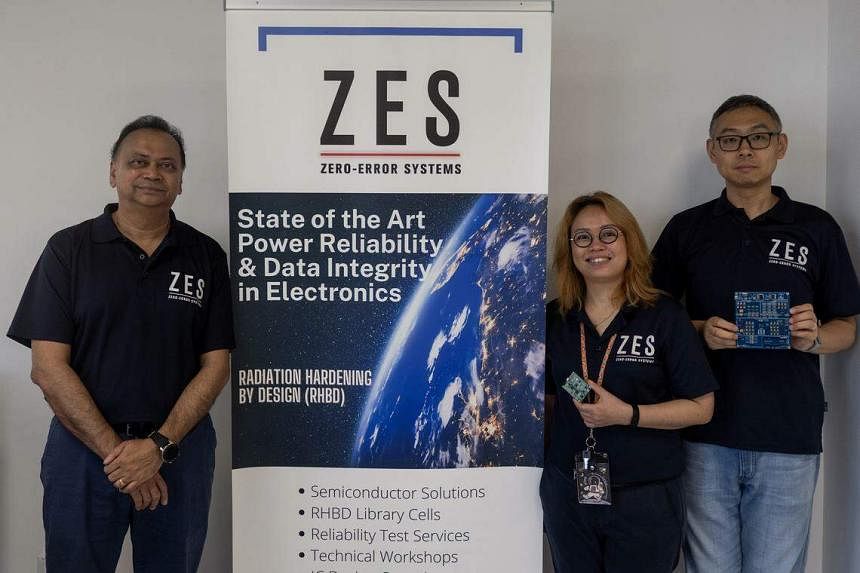SINGAPORE - Renowned for its urban landscape and small size, Singapore would not be the first country that comes to anyone’s mind when contemplating the vast emptiness of outer space, or even when thinking of space launches.
Yet the city state is home to a growing space industry.
Singapore has sent more than 20 satellites up to space since 2011, most of which were used for research purposes. Three of these satellites were launched in June 2022.
According to Singapore’s Office for Space Technology and Industry, the local space sector comprises over 2,000 professionals and researchers working in more than 60 companies active in different verticals – from design and manufacturing to satellite-based services such as data processing.
One of these companies, Equatorial Space Systems, bagged US$1.5 million (S$2 million) in a seed funding round led by Elev8 earlier in 2023. Other investors include Seeds Capital and Masik Enterprises.
Ms Tan Kaixin, general manager of Seeds Capital, said that much of this growth can be attributed to Singapore’s reputation as a “fertile ground for ventures”, supported by its strong culture of innovation and entrepreneurship.
“While space has predominantly been the domain of large government entities, continuous innovation has led to significantly reduced development and operating costs of space technology such as satellites, lowering the barriers to entry for smaller players and start-ups,” she told The Straits Times.
Mr Simon Gwozdz, chief executive and founder of Equatorial Space Systems, a rocket propulsion and space launch start-up, believes that the Republic’s location is ideal, particularly for launch capabilities in the future.
“Singapore’s fortunes have long been facilitated by its lucky location and, interestingly enough, this extends to space access. Near-equatorial sites are the best as they allow satellite launch directly to every kind and type of orbit, without any extensive manoeuvres in space,” he said.
Equatorial Space Systems is aiming to provide space access at reduced risk, cost and environmental impact as compared with incumbent solutions, which often use expensive and highly explosive fully liquid-propelled systems.
Its Low Altitude Demonstrator rocket, which was launched from Malaysia, became the first commercially built prototype rocket test flight in South-east Asia in December 2020.
In February, Transcelestial, a wireless laser communications start-up based here, raised US$10 million in a series A2 funding round led by Airbus Ventures. It aims to develop a constellation of small satellites positioned in low Earth orbit, allowing its laser network to beam not only across cities, but also upwards to connect continents.
Transcelestial uses its proprietary wireless laser communication technology to create a wireless distribution network between buildings, traditional cell towers, street-level poles, and other physical infrastructure. It claims that this means lower operating costs for mobile network operators, Internet service providers, and enterprises.
But there are challenges for Singapore’s still-nascent space sector, particularly at a time when the industry is facing macroeconomic headwinds.
Data from US venture capital firm Space Capital reveals that global investments in space start-ups experienced a decline of more than 50 per cent in 2022, dropping to US$21.9 billion from its all-time high of US$45.7 billion in 2021, as investors flocked to safer bets amid the worsening economic outlook.
Singapore’s lack of manpower and infrastructure also poses a challenge to its space start-up ecosystem.
Mr Rohit Jha, chief executive and co-founder of Transcelestial, said that Singapore’s space industry does not have the history nor the resources that countries such as the US, Russia, India and China possess. This makes it difficult to “get something off the ground”.
“Most ecosystems need ‘scar tissue’ especially when it comes to space where it is so easy to fail and so hard to moderately deliver,” he explained, referring to how Singapore has a relatively small space budget and a limited supply of space tech talent.
“But Singapore has a highly technical workforce and is great at importing, retaining and upskilling talent,” Mr Jha added.
Ms Hwai Lin Khor, vice-president of semiconductor start-up Zero Error Systems, agrees that Singapore has a small space start-up ecosystem, and that its shallow talent pool is a “major challenge”.
“Although it’s sometimes argued that Singapore has a large talent pool in semiconductors, Zero Error Systems’ space business is akin to highly specialised, high-reliability semiconductors, where the manpower pool is small,” she said.
Ms Khor also noted the geopolitical tensions between the US and China mean that start-ups based in Singapore like Zero Error Systems “would need to choose one of the two markets”, which are the world’s largest economies.
Founded in 2019 as a spin-off from Nanyang Technological University, Zero Error System provides a patented, radiation-hardened solution to safeguard commercial off-the-shelf semiconductor devices that are not designed to withstand the harsh conditions in outer space.
The start-up raised US$7.5 million in an oversubscribed series A funding round in June from investors including Airbus Ventures and Dart Family Office.

Despite the challenges, Singapore is positioned to support space start-ups, with initiatives offered by both government and non-governmental organisations.
Non-governmental organisation Singapore Space and Technology Limited (SSTL) launched a space-based accelerator programme in 2020 that has supported 44 start-ups to date.
Supported by Enterprise Singapore, the accelerator works with both local and international start-ups of varying maturity levels, from pre-seed up to series B.
Ms Lynette Tan, chief executive of Space Faculty and its parent company SSTL, said that Singapore is an ideal launch pad for space start-ups because of the ease of doing business and the presence of strong financial infrastructure to support fund raising. She also pointed out that the country’s neutrality is a key factor.
“Singapore is a neutral place for business in an increasingly political environment for space technologies,” she said.


